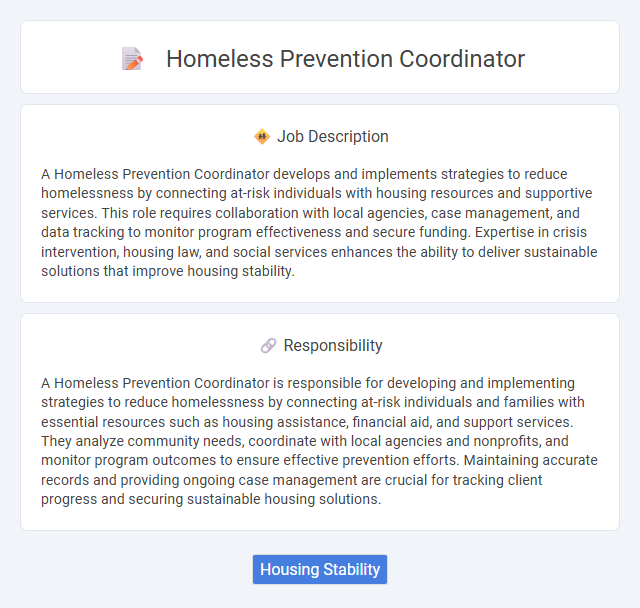
A Homeless Prevention Coordinator develops and implements strategies to reduce homelessness by connecting at-risk individuals with housing resources and supportive services. This role requires collaboration with local agencies, case management, and data tracking to monitor program effectiveness and secure funding. Expertise in crisis intervention, housing law, and social services enhances the ability to deliver sustainable solutions that improve housing stability.
Individuals with strong empathy and problem-solving skills will likely be well-suited for a Homeless Prevention Coordinator role, as the job involves working closely with vulnerable populations facing housing instability. Those who handle high-stress environments calmly and possess excellent communication abilities may find it easier to navigate the complexities of coordinating resources and support services. Candidates lacking patience or a genuine interest in social services might struggle to effectively assist people experiencing homelessness or at risk of losing their housing.
Qualification
A Homeless Prevention Coordinator typically requires a bachelor's degree in social work, human services, or a related field, along with experience in case management, crisis intervention, and housing assistance programs. Proficiency in local housing resources, strong communication skills, and knowledge of federal and state homelessness prevention policies are essential. Certification in trauma-informed care or relevant counseling credentials can enhance job performance and effectiveness.
Responsibility
A Homeless Prevention Coordinator is responsible for developing and implementing strategies to reduce homelessness by connecting at-risk individuals and families with essential resources such as housing assistance, financial aid, and support services. They analyze community needs, coordinate with local agencies and nonprofits, and monitor program outcomes to ensure effective prevention efforts. Maintaining accurate records and providing ongoing case management are crucial for tracking client progress and securing sustainable housing solutions.
Benefit
Hiring a Homeless Prevention Coordinator is likely to significantly reduce the risk of homelessness within the community by connecting individuals to resources and support systems early. Their role probably improves housing stability and lowers the need for emergency shelter services, which can save municipal costs over time. The position may also enhance collaboration among social services, increasing overall effectiveness in addressing homelessness.
Challenge
The challenge of a Homeless Prevention Coordinator role likely involves coordinating resources to effectively address the complex and evolving needs of at-risk populations. Navigating bureaucratic constraints and securing sustainable funding may pose ongoing difficulties in maintaining consistent support services. Success probably depends on strong collaboration with community organizations and adaptability to fluctuating homelessness trends.
Career Advancement
A Homeless Prevention Coordinator plays a vital role in connecting at-risk individuals with housing resources, social services, and financial assistance to prevent homelessness. Career advancement opportunities include moving into managerial roles, such as Program Director or Housing Services Manager, or specializing in policy development and advocacy within government agencies or non-profits. Gaining expertise in case management software, grant writing, and community partnership development enhances prospects for leadership positions in social services and public administration.
Key Terms
Housing Stability
The Homeless Prevention Coordinator develops and implements strategic programs to enhance housing stability by identifying at-risk individuals and connecting them with resources such as rental assistance, case management, and supportive services. They analyze housing data to tailor prevention efforts, reduce eviction rates, and promote long-term tenancy retention. Collaboration with local agencies and landlords ensures the creation of sustainable housing solutions that address the root causes of homelessness.
 kuljobs.com
kuljobs.com